Foreign Policy and National Security Challenges for the Obama Administration
Karen DeYoung, The Washington Post
David Sanger, The New York Times
Elisabeth Bumiller (moderator), The New York Times
Photos
Washington, DC—On April 30, 2014, journalists Karen DeYoung, senior national security correspondent and associate editor of The Washington Post, and David Sanger, national security correspondent for The New York Times, discussed foreign policy and national security challenges facing the Obama administration in a conversation moderated by Elisabeth Bumiller, deputy Washington bureau chief of The New York Times and a member of the WFPG Board of Directors. The conversation covered a broad range of topics including the ongoing crisis in Ukraine, the negotiations on Iran’s nuclear program, the end of the US combat mission in Afghanistan, the Middle East peace process, President Obama’s recent trip to Asia, and Obama’s leadership in foreign affairs.
Throughout the conversation, DeYoung and Sanger emphasized the difficulties faced by the Obama administration in demonstrating American leadership throughout the world while balancing the concerns of an engagement-weary American public. While discussing the crisis in Crimea, DeYoung maintained that the will does not exist among the American people to justify overt military involvement in Ukraine. She noted that the President has not used the “bully pulpit” to address the American people about the situation in terms of America’s strategic interests and obligations. Both speakers agreed that the sanctions, intended to weaken the Russian economy and strengthen the government in Kiev, have failed to deter Putin’s aggression. Sanger also expressed reservations about the impact of the West’s actions towards Russia, suggesting that a weakened Russia with a grudge against the US would be more dangerous in the long-term than a strong Russia comfortable with its place in the world.
Both DeYoung and Sanger discussed America’s foreign policy priorities in the Middle East. Sanger identified the negotiations on Iran’s nuclear program as the White House’s highest priority in the region and emphasized the possibility of a “big win” for President Obama if the negotiations are successful. Despite this, he doubted the likelihood of a finalized agreement before the July deadline. Regarding the end of the US combat mission in Afghanistan, Sanger voiced doubts about the efficacy of the diminished number of remaining troops, while DeYoung speculated that the Afghan economy could be destabilized by a post-withdrawal decrease in foreign aid. On the issue of the Israeli-Palestinian conflict, DeYoung insisted that the deterioration of the negotiations was not due to a “problem of low expectations or a lack of inspiration” on the part of Secretary Kerry. Sanger added that the administration never saw the negotiations as an opportunity for success, and questioned why Secretary Kerry would devote so much time and political capital to “dealing with the number three problem in the number two area of the world for the President’s priorities”.
Sanger described President Obama’s foreign policy as being caught between “the super state problem in the Pacific and the failing state problem in the Middle East”. He explained that while the administration has continued to affirm its commitment to the Asia-Pacific region, the diplomatic and defense pivot has been slow to materialize due to the ongoing instability in the Middle East. It is in this context that an emboldened China has sought to expand its influence. President Obama’s recent trip sought to reassure its allies of American commitment and establish a strong presence in the South China Sea. Sanger explained that while the president may have “said all the right things”, his assurances would need to be translated to concrete action if a situation demanded it.
Reflecting on President Obama’s broader foreign policy, both speakers maintained that his policies are coherent but that he has been unable to translate them into a broader doctrine explainable to the American public. Sanger emphasized that America’s current foreign policy reflects the national mood and is focused on its strategic interests, but pointed out that the “light footprint” that was successfully used in the first term has not worked in the conflicts of President Obama’s second term. They spoke of the declining support of using “boots on the ground” in foreign conflicts and Sanger described how this environment has contributed to the rise of cyber warfare as a tool of American power.
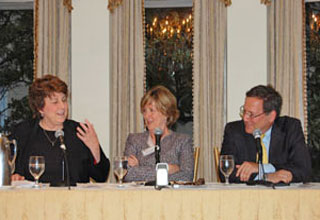 |
 |
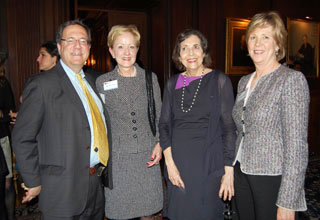 |
|
Karen DeYoung, Washington Post, and David Sanger,
New York Times, with moderator Elisabeth Bumiller
|
|
David Sanger with WFPG Board Chair Ann Stock,
WFPG President Patricia Ellis & Board Member Elisabeth Bumiller
|
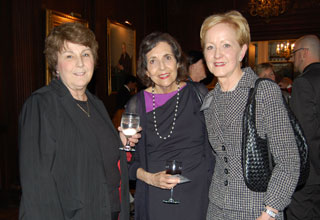 |
 |
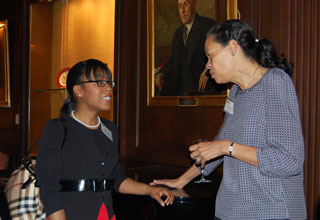 |
|
Karen DeYoung, Patricia Ellis, and Ann Stock
|
|
Board Vice Chair Gail Leftwich Kitch with
Amirah Salaam of NAFSA:
Association of International Educators
|
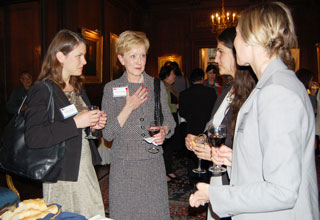 |
 |
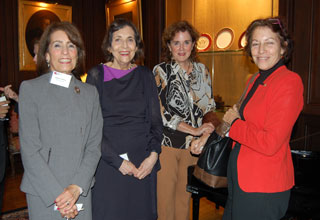 |
|
Ann Stock speaks with program attendees
|
|
Ronna Freiberg, Patricia Ellis,
Donna Constantinople, and Jill Schuker
|
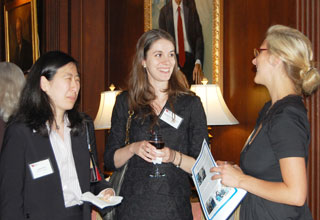 |
 |
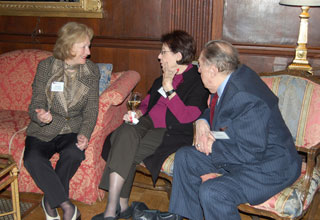 |
|
WFPG Associate Director Kimberly Kahnhauser
speaks with WFPG members and guests
|
|
Susan Pearce speaks with Betty and Joeseph Dukert
|
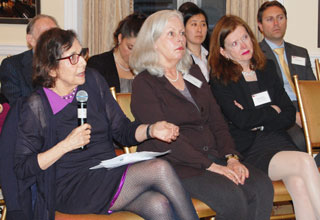 |
 |
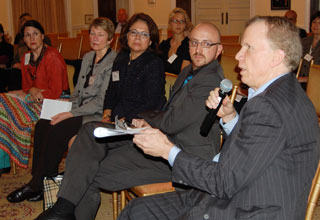 |
|
Patricia Ellis asks a question
|
|
Christopher Parks during the Q&A
|
|
|